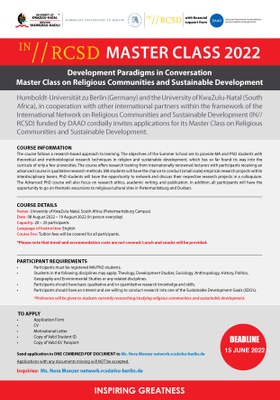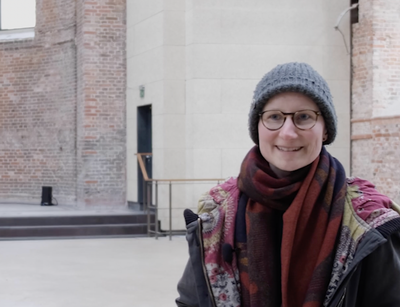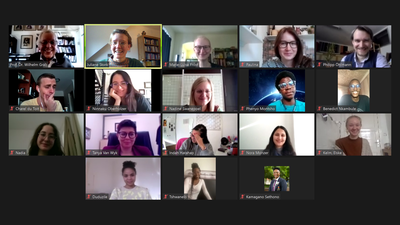Celebrating the Life and Legacy of Professor Wilhelm Gräb
Dear Colleagues and Friends,
It is with great sadness that we are writing this note to inform you that Professor Wilhelm Gräb, co-leader of our Research Programme, has passed on. After fighting cancer for nearly three years, his life on earth ended in Berlin on 23 January 2023.
Wilhelm Gräb was one of Germany’s leading Practical Theologians. He was co-founder and head of the Research Programme on Religious Communities and Sustainable Development at Humboldt-Universität zu Berlin, Senior Advisor at the Faculty of Theology and Principal Investigator in the International Research Training Group “Transformative Religion” as well as Extraordinary Professor at Stellenbosch University.
Professor Gräb was an exceptional scholar, committed to expanding the boundaries of knowledge through research and critical engagement. His work and advice have formed and inspired generations of students and scholars and his manifold contributions to theology and empirical research in religion will continue to inspire generations to come.
Moreover, Wilhelm Gräb was an exceptional person, appreciated for his kindness, humility and Menschlichkeit. His creativity and energy, his sharp and constructive criticism, his joyfulness and laughs and his combination of pragmatism and visionary leadership will be dearly missed.
We would like to invite you to join us in remembrance and prayers, comforted in all sadness by knowing that Wilhelm Gräb is now in a better place. In the thankfulness for Wilhelm Gräb’s life and for having known him and journeyed with him, we would also like to invite you to join us in celebrating his life as an extraordinary scholar, colleague, mentor and friend.
Yours sincerely,
Philipp Öhlmann, Marie-Luise Frost, Madlen Geidel, Sura Mahmood, Nora Monzer, Nina van der Puije, Almut-Barbara Renger, Raphael Sartorius, Daniel Schumacher, Ekkardt Sonntag and Juliane Stork on behalf of the Research Programme on Religious Communities and Sustainable Development
Welcome to the Research Programme on Religious Communities and Sustainable Development!
Current News
Iraqi Delegation Visit
The Research Programme on Religious Communities and Sustainable Development invited an Iraqi delegation of academics, religious actors and religious minoritiy activists headed by Dr. Saad Salloum to visit Humboldt University's main campus. The guests were taken on a tour to learn more about the history of the university. The delegation and the Research Programme discussed different ways for further collaboration and explored exchange opportunities for Iraqi students. The delegation members were:
Dr. Muhannad Jamal al-Din, professor of Islamic sciences at the University of Kufa
Dr. Mujtaba Al-Helou, Assistant Professor of English Literature at Karbala University
Dr. Mona Hassan, Professor of Comparative Literature at the University of Kufa
Dr. Khaled Abdel-Ilah, Dean of the College of Political Science at Al-Mustansiriya University
Dr. Saad Salloum, President of the Masarat Foundation and founder of the Institute for Religious Diversity Studies
Mr. Ali Zwain, head of the media department at the European Foundation for Interfaith Understanding
Ms. Hilal Alo, activist for Yezidis and minorities' rights.
The Research Programme RCSD appreciates the support of the International Office of Humboldt University in facilitating this tour and is thankful for their time and flexibility.
Guest Lecture on “Religion and Development in West Africa”

In the framework the IRTG Programme Transformative Religion Dr. Amevenku talked on how Mother Tongue Biblical Hermeneutics as indigenous cultural resource can contribute to social transformation. Together with Professor Madipoane Masenya, Biblical and Ancient Studies, University of South Africa, Pretoria the speakers discussed the liberation and transformational potentials of African biblical hermeneutics for societal wellbeing.
Video Playlist: Lecture Series on Religion and Ecology

The lecture series explored these questions by focusing on the relationship between religious communities and socio-ecological transformations. We are delighted to announce that we just published the presentations on our YouTube channel. We would like to express our gratitude to the lecturers for their thought-provoking presentations.
Find the „Lecture Series“ Playlist here.
Newly Published: 'I Got the Call – Not Him' Founding an African Initiated Church as an Act of Emancipation
Marie-Luise Frost’s newest article “'I Got the Call – Not Him' Founding an African Initiated Church as an Act of Emancipation” was published in the Journal of Religion in Africa.
This paper examines how the call to found their own churches has allowed and enabled women to challenge social and doctrinal norms and thus to emancipate themselves from traditional gender roles. It focuses on African Initiated Churches including both African Independent and Pentecostal Charismatic Churches.
Click here to read the article.
Newly Published: South African Youth and the Labor Market
Philipp Öhlmann’s newest article “South African Youth and the Labor Market” was published in the Open Access Journal Youth.
South Africa continues to be marked by high youth unemployment. This paper investigates youth labor market perspectives in northern South Africa in the light of data from the Livelihoods, Religion and Youth Survey. The results indicate that the social capital created in religious communities seems to contribute to youth labor market success.
Click here to read the article.
Call for Application: Consultancy for an inter-faith textbook project on integral ecology

Location: Anywhere
Category: Consultancy
Fee: 1190 GBP
Estimated number of days: 12 days
Deadline for the report, consisting of the above four parts: 15th January 2023.
Background of the consultant:
Masters or PhD level in Theology, Religious Studies, or related fields with a strong ecological focus.
Preference will be given to someone undertaking doctoral studies in Berlin or Oxford.
Application deadline: 30th September 2022
To apply, please send a cover letter and a CV to Juliane Stork at: juliane.stork@hu-berlin.de
Further information can be found here.
Newly Published: International Handbook on Creation Care and Eco-Diakonia

The chapters reflect on eco-theology, protection of biodiversity, ecological transformation, and ethics of sustainability through Southern lenses. The volume presents fascinating diverse insights on the “greening of religion”.
The link to the handbook can be found here.
Newly Published: The State of the Evidence in Religions and Development

The link to the publication can be found here.
Call for Applications: The IN//RCSD Master Class "Development Paradigms in Conversation - Master Class on Religious Communities and Sustainable Development" | Deadline 15 June 2022
In-person Class. 08 August - 19 August 2022 - University of KwaZulu-Natal, South Africa (Pietermaritzburg Campus)

The application form can be found here.
We are very delighted to announce the application for the IN//RCSD Master Class 2022 is now open! Kindly find the overview of the application here.
The objectives are to provide MA and PhD students with theoretical and methodological research techniques in religion and sustainable development, which has so far found its way into the curricula of only a few universities. The course offers research training from internationally renowned lecturers with participants receiving an advanced course in qualitative research methods.
Further information can be found here.
Send application in ONE COMBINED PDF DOCUMENT to Ms Nora Monzer network.rcsd@hu-berlin.de
Invitation: Lecture Series on Religion and Ecology | 20 May, 25 June, 08 July 2022

Kindly find the information here.
We are very delighted to invite you to participate in the Lecture Series on Religion and Ecology.
How are religion and sustainability related? Do religious communities contribute to social transformations towards sustainability? And if so, in which ways? Or does religion in fact hinder or counteract sustainability?
The lecture series explores these questions by focusing on the relationship between religious communities and socio-ecological transformations. Kindly register to Ms Anna Linnéa Herrmann: anna.linnea.herrmann@hu-berlin.de
Philipp Öhlmann and International Partnership on Religion and Sustainable Development (PaRD) on "Prayers and Policy": How Governments and Religious Actors Can Meet Sustainable Development Goals Together

Please click here to find the full article.
Recent studies show that insecurity increases religiosity in societies; simply put, religion plays a more significant role in places where development cooperation is relevant. The reluctance to formalise government cooperation with religious organisations has political, social, and historical validity. Yet, as Philipp Öhlmann points out, “we need to show people the relevance of religion independent of their own attitude or disposition towards it.”
Newsletter 02/2021
Please click here to find our current newsletter.
Here, we provide news from our Research Programme as well as information concerning new publications, upcoming events and our most recent activities.
A Panel Discussion on Sustainability with Philipp Öhlmann, Katharina Pyschny, Mona Feise-Nasr and Wolfram Stierle
"Glauben & Wissen. Theologiegespräche an der HU": Nachhaltigkeit
Please click here to find the talk (in German).
Climate change and its ecological and social consequences, the exploitation of natural resources and the extinction of animal and plant species - humanity is responsible for all this. In this interview, the speakers discussed this topic more in depth.
Radio Interview on Religion and Sustainability in the Deutschlandfunk Program "Climate Talks" with Philipp Öhlmann.
 Please click here to find the full article (in German).
Please click here to find the full article (in German).
„Klimaschutz & Religion. Was die Kirchen sagen – und was sie tun“.
Philipp Öhlmann was interviewed for this interesting program of Deutschlandfunk. He talked about the contribution of churches in the field of climate protection in Africa. In particular, he highlighted their role in relation to sustainable agriculture. If you want to know more about this topic and about the role climate protection plays in German churches, we invite you to read the whole article here.
Religion and Sustainability: Interview with Marie-Luise Frost on the Sustainability Webportal of Humboldt17
 Please click here to find the interview (in German).
Please click here to find the interview (in German).
Religion connects people, their faith brings them together to shape society together. This is especially true in those regions of the world where religious communities are the most important local institutions. Can communities there contribute to sustainable development? And if so, what role do religion and religiosity play in this process of change? These are the questions that researchers at the Research Programme on Religious Communities and Sustainable Development (RCSD) want to answer.
Research Result and Policy Recommendations for German Development Policy
"Potentials of Cooperation with African Initiated Churches for Sustainable Development"
We are delighted to publish the English version of the Research Result and Policy Recommendations for German Development Policy by Philipp Öhlmann, Marie-Luise Frost and Wilhelm Gräb. The German version is accessible here.
Newsletter 01/2021
 Please click here to find our current newsletter.
Please click here to find our current newsletter.
Here, we provide news from our Research Programme as well as information concerning new publications, upcoming events and our most recent activities.







